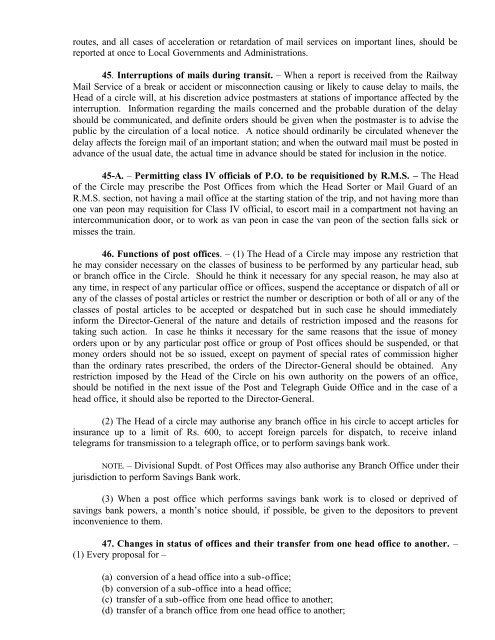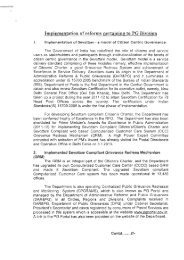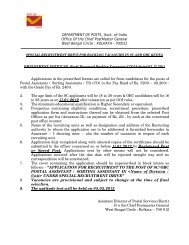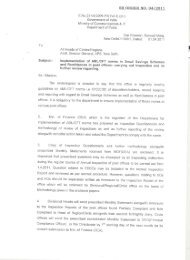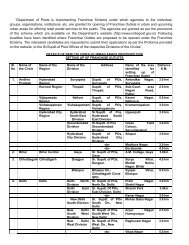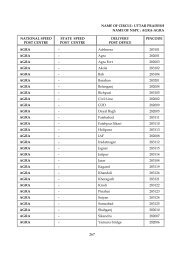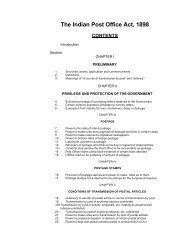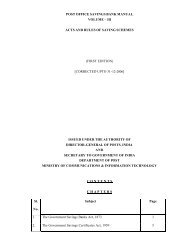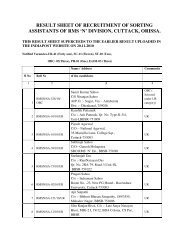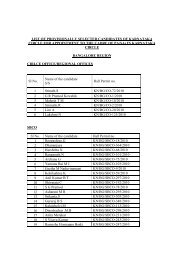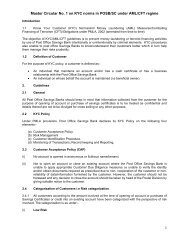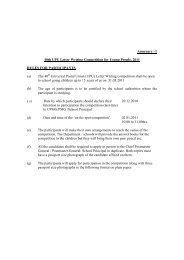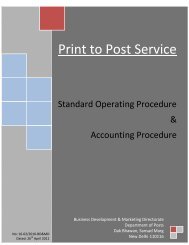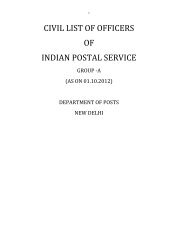Postal Manual Vol. VIII - India Post
Postal Manual Vol. VIII - India Post
Postal Manual Vol. VIII - India Post
You also want an ePaper? Increase the reach of your titles
YUMPU automatically turns print PDFs into web optimized ePapers that Google loves.
outes, and all cases of acceleration or retardation of mail services on important lines, should be<br />
reported at once to Local Governments and Administrations.<br />
45. Interruptions of mails during transit. – When a report is received from the Railway<br />
Mail Service of a break or accident or misconnection causing or likely to cause delay to mails, the<br />
Head of a circle will, at his discretion advice postmasters at stations of importance affected by the<br />
interruption. Information regarding the mails concerned and the probable duration of the delay<br />
should be communicated, and definite orders should be given when the postmaster is to advise the<br />
public by the circulation of a local notice. A notice should ordinarily be circulated whenever the<br />
delay affects the foreign mail of an important station; and when the outward mail must be posted in<br />
advance of the usual date, the actual time in advance should be stated for inclusion in the notice.<br />
45-A. – Permitting class IV officials of P.O. to be requisitioned by R.M.S. – The Head<br />
of the Circle may prescribe the <strong>Post</strong> Offices from which the Head Sorter or Mail Guard of an<br />
R.M.S. section, not having a mail office at the starting station of the trip, and not having more than<br />
one van peon may requisition for Class IV official, to escort mail in a compartment not having an<br />
intercommunication door, or to work as van peon in case the van peon of the section falls sick or<br />
misses the train.<br />
46. Functions of post offices. – (1) The Head of a Circle may impose any restriction that<br />
he may consider necessary on the classes of business to be performed by any particular head, sub<br />
or branch office in the Circle. Should he think it necessary for any special reason, he may also at<br />
any time, in respect of any particular office or offices, suspend the acceptance or dispatch of all or<br />
any of the classes of postal articles or restrict the number or description or both of all or any of the<br />
classes of postal articles to be accepted or despatched but in such case he should immediately<br />
inform the Director-General of the nature and details of restriction imposed and the reasons for<br />
taking such action. In case he thinks it necessary for the same reasons that the issue of money<br />
orders upon or by any particular post office or group of <strong>Post</strong> offices should be suspended, or that<br />
money orders should not be so issued, except on payment of special rates of commission higher<br />
than the ordinary rates prescribed, the orders of the Director-General should be obtained. Any<br />
restriction imposed by the Head of the Circle on his own authority on the powers of an office,<br />
should be notified in the next issue of the <strong>Post</strong> and Telegraph Guide Office and in the case of a<br />
head office, it should also be reported to the Director-General.<br />
(2) The Head of a circle may authorise any branch office in his circle to accept articles for<br />
insurance up to a limit of Rs. 600, to accept foreign parcels for dispatch, to receive inland<br />
telegrams for transmission to a telegraph office, or to perform savings bank work.<br />
NOTE. – Divisional Supdt. of <strong>Post</strong> Offices may also authorise any Branch Office under their<br />
jurisdiction to perform Savings Bank work.<br />
(3) When a post office which performs savings bank work is to closed or deprived of<br />
savings bank powers, a month’s notice should, if possible, be given to the depositors to prevent<br />
inconvenience to them.<br />
47. Changes in status of offices and their transfer from one head office to another. –<br />
(1) Every proposal for –<br />
(a) conversion of a head office into a sub-office;<br />
(b) conversion of a sub-office into a head office;<br />
(c) transfer of a sub-office from one head office to another;<br />
(d) transfer of a branch office from one head office to another;


